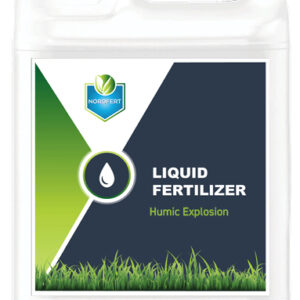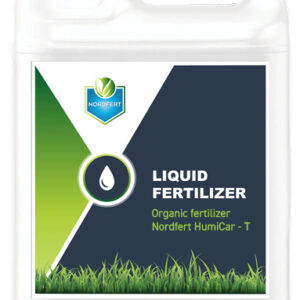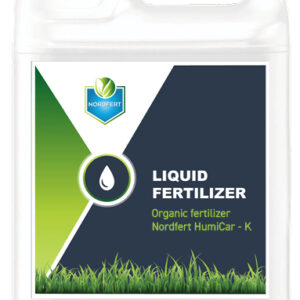Time to read: only 5 minutes.
In the ever-evolving world of agriculture, humic acid emerges as a game-changer with a multitude of benefits. Derived from organic matter, humic acid offers a plethora of advantages for both soil and plants.
Quick links:
Unveiling The Power of Humic Acid in Agriculture
What is Humic Acid
The Science Behind Humic Acid
Environmental Sustainability
Nordfert Fertilizers: A Legacy of Excellence
Nordfert’s Humic Acid Products
Eco-Friendly Approach
Join the Nordfert Revolution
Frequently Asked Questions about Humic Acid
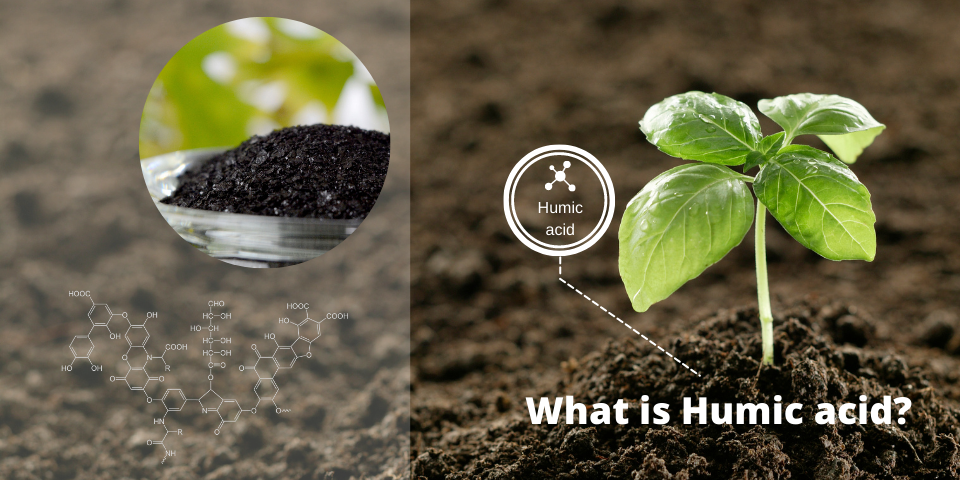
Unveiling The Power of Humic Acid in Agriculture
In the world of agriculture, the quest for maximizing crop yields and enhancing soil health is an ongoing endeavor. One remarkable ally in this mission is humic acid. This natural substance, derived from organic matter, has gained significant attention in recent years for its numerous benefits in agriculture. In this comprehensive guide, we will delve deep into the world of humic acid, exploring its benefits, applications, and its role in the future of sustainable farming.
What is Humic Acid?
Before we dive into the benefits, let’s understand what humic acid is. Humic acid is a natural, organic compound that forms as a result of the decomposition of organic matter. It is a vital component of humus, the dark, organic material that enriches soil. Now, let’s explore why humic acid is making waves in agriculture.
Humic acid, a product of organic matter decomposition, holds the key to soil fertility and plant health.
Humic Acid Unveiled
Humic acid is a complex organic compound that forms as a result of the decomposition of organic matter such as decaying plants and microbial activity in the soil. It is one of the essential components of humus, the dark, organic material that enriches soil and enhances its fertility.
The Science Behind Humic Acid
To understand its benefits fully, it’s crucial to recognize that humic acid comprises various organic molecules, including humins, humic acids, and fulvic acids. These components work in tandem to provide a range of advantages to plants and soil.
Enhanced Nutrient Uptake
One of the most significant advantages of humic acid is its ability to enhance nutrient uptake in plants. It does this by increasing the cation exchange capacity (CEC) of the soil. In simple terms, this means that soil with humic acid can retain and release nutrients more effectively, ensuring that plants have access to essential elements like nitrogen, phosphorus, and potassium when they need them. This results in healthier, more robust plant growth.
Improved Soil Structure
Humic acid also contributes to improved soil structure. It promotes soil aggregation, which means that soil particles clump together, creating larger pore spaces. This improved structure enhances soil aeration, drainage, and water retention. In essence, it reduces the risk of soil compaction, erosion, and water runoff, making the soil more resilient to environmental stresses.
Stimulation of Microbial Activity
Healthy soil is teeming with beneficial microbes that play a crucial role in nutrient cycling and disease suppression. Humic acid acts as a microbial stimulant, providing an ideal environment for these microbes to thrive. As a result, the soil’s ecosystem becomes more dynamic and resilient, leading to improved plant health.
Resistance to Environmental Stressors
Plants treated with humic acid have shown increased resistance to various environmental stressors. Whether it’s drought, extreme temperatures, or diseases, humic acid helps plants build resistance mechanisms. This not only ensures better crop yields but also reduces the need for chemical interventions like pesticides and herbicides.
pH Regulation
Humic acid acts as a buffer, helping to regulate soil pH levels. This is particularly valuable in acidic soils, where it can raise the pH towards a more neutral range, making it suitable for a broader range of crops. Balanced soil pH is crucial for nutrient availability, and humic acid aids in achieving this balance.
Environmental Sustainability
In an era where sustainable agriculture is paramount, humic acid has emerged as an eco-friendly solution. By improving nutrient efficiency and reducing the need for chemical fertilizers and pesticides, it helps reduce the environmental impact of farming. It aligns perfectly with the principles of organic and sustainable agriculture.
In summary
The benefits of humic acid in agriculture are undeniable. Its capacity to enhance nutrient uptake, improve soil structure, stimulate microbial activity, and bolster plant resistance to stressors make it a valuable tool in modern farming. Furthermore, its environmentally sustainable nature aligns with the growing global demand for eco-friendly agricultural practices.
As agriculture continues to evolve, incorporating humic acid into farming practices promises to be a vital step towards increased productivity, improved soil health, and a more sustainable future for our planet. Farmers and environmentalists alike are recognizing humic acid as a powerful ally in the quest for a greener and more bountiful world.
Ready to harness the power of humic acid and revolutionize your approach to agriculture?
It’s time to take action and embrace this eco-friendly, sustainable solution. Whether you’re a seasoned farmer, a passionate gardener, or simply someone who cares about the future of our food supply and the environment, you can make a difference.
Contact Us Today – Reach out to us to learn more about incorporating humic acid into your farming practices, and discover how it can enhance your crop yields, improve soil health, and contribute to a greener, more sustainable world. Join us in this journey towards a brighter, bountiful, and environmentally responsible future for agriculture. Together, we can make a lasting impact.
Nordfert Fertilizers Ltd: A Legacy of Excellence
In the world of agriculture, innovation and sustainability are key drivers of success. One company that has been at the forefront of this movement is Nordfert Fertilizers Ltd. With a rich history spanning over 25 years, NordFert has earned a stellar reputation for producing high-quality foliar fertilizers. What sets us apart is our unwavering commitment to sharing professional knowledge and our recent expansion into the world of humic acid.
Nordfert Fertilizers Ltd. has been a trusted name in the agricultural industry for a quarter of a century. Founded in 1991, the company has consistently delivered high-quality fertilizers that enhance crop yields and soil health.
With active factories worldwide, NordFert has a vast reach that extends to more than 30 countries. This global footprint enables them to impact agricultural sectors across diverse regions.
In early 2021, Nordfert took a significant step forward by opening its newest factory in Northern Europe, in Estonia. This state-of-the-art facility signifies the company’s commitment to staying at the forefront of agricultural innovation.
Humic Acid: The Game-Changer in Agriculture
Humic acid is a natural substance derived from organic matter decomposition. Its properties make it a game-changer in modern agriculture. Nordfert recognizes the immense potential of humic acid and is actively incorporating it into their product offerings.
Why Humic Acid Matters
Humic acid enhances soil structure, promotes nutrient uptake, and boosts plant health. It’s an eco-friendly solution that aligns perfectly with sustainable farming practices.
Nordfert’s Humic Acid Products
NordFert’s expertise in foliar fertilizers extends to humic acid-based products. These formulations are designed to maximize the benefits of humic acid by delivering it directly to the plant’s leaves.
Eco-Friendly Approach
Nordfert’s humic acid products are designed with the environment in mind. They reduce the reliance on synthetic fertilizers, minimizing the environmental footprint of farming practices.
Spreading Knowledge for Agricultural Advancement
Nordfert Fertilizers Ltd. doesn’t just provide products; they are passionate about sharing their professional knowledge with farmers worldwide. This commitment to education empowers farmers to make informed decisions and optimize their agricultural practices.
Collaborative Partnerships
NordFert collaborates with agricultural experts and organizations to conduct research, develop new solutions, and disseminate valuable information to the farming community.
The Future of Agriculture with Nordfert – A Sustainable Vision
As the world faces increasing challenges in agriculture, Nordfert Fertilizers Ltd. stands as a beacon of hope. Their dedication to sustainable, eco-friendly solutions, such as humic acid, paves the way for a brighter and more bountiful agricultural future.
Join the Nordfert Revolution
Whether you’re a farmer looking to boost your crop yields or an environmentally conscious consumer concerned about the future of food, Nordfert invites you to join their mission. Together, we can elevate agriculture and maximize the quality of cultivable crops worldwide.
Nordfert Fertilizers Ltd.’s journey from a legacy of excellence to their innovative embrace of humic acid showcases their unwavering commitment to advancing agriculture. With a global presence, eco-friendly products, and a dedication to knowledge sharing, Nordfert is a company that’s not just in the business of agriculture; they’re in the business of shaping a sustainable future for us all.
Ready to harness the power of humic acid and revolutionize your approach to agriculture?
Frequently Asked Questions about Humic Acid
What are humic acids, and where are they found in nature?
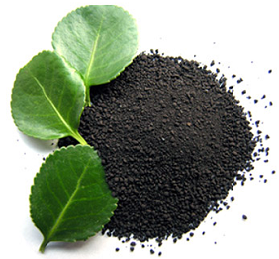
Humic acids are complex organic compounds that occur naturally in soil, peat, and other organic materials. They are a part of the humic substance family, which also includes fulvic acids and humins. These acids are formed through the decomposition of organic matter by microorganisms over long periods of time.
What is the role of humic acids in soil?
Humic acids play several crucial roles in soil:
Nutrient Retention: They have a high cation exchange capacity (CEC), which means they can hold onto and release essential nutrients like potassium, calcium, and magnesium, making these nutrients more available to plants.
Improved Soil Structure: Humic acids can enhance soil structure by promoting the formation of stable aggregates, which improves aeration, water infiltration, and root penetration.
pH Buffering: They act as natural pH buffers, helping to maintain a stable pH level in the soil, which is important for nutrient availability to plants.
Microbial Activity: Humic acids can stimulate beneficial microbial activity in the soil, which aids in nutrient cycling and organic matter decomposition.
How can humic acids be extracted from natural sources?
Humic acids can be extracted from natural sources, such as peat, leonardite (a type of coal), and soil, using various methods. One common method is the alkaline extraction process, where the source material is mixed with an alkaline solution (usually sodium hydroxide or potassium hydroxide) and then acidified to precipitate the humic acids. Another method involves using strong acids to dissolve the minerals and leave behind the humic acids.
What are the applications of humic acids in agriculture?
Humic acids have several applications in agriculture:
Soil Amendment: They can be added to soil as a soil conditioner to improve soil structure, increase nutrient availability, and enhance microbial activity.
Fertilizer Enhancer: Humic acids can be combined with fertilizers to increase nutrient uptake by plants and reduce nutrient leaching.
Seed Treatment: They can be used as seed coatings to improve germination rates and seedling vigor.
Stress Resistance: Humic acids may help plants become more resistant to environmental stresses, such as drought and disease.
Are there any environmental benefits associated with the use of humic acids?
Yes, the use of humic acids in agriculture can have environmental benefits:
Reduced Chemical Inputs: By improving nutrient retention and availability in the soil, humic acids can help reduce the need for synthetic fertilizers, which can minimize nutrient runoff into water bodies.
Carbon Sequestration: Humic substances, including humic acids, are organic carbon compounds that can contribute to soil carbon sequestration, helping combat climate change.
Enhanced Soil Health: Improved soil structure and microbial activity promoted by humic acids can lead to healthier soils, which in turn can support diverse ecosystems and better water quality.
Sustainable Agriculture: The use of humic acids aligns with principles of sustainable agriculture by reducing environmental impacts and enhancing soil fertility in a natural way.
Can humic acids be used in organic farming?
Yes, humic acids are allowed for use in organic farming in many regions, as they are considered natural substances. However, it’s essential to verify the specific organic certification standards in your area to ensure compliance. Organic farmers often use humic acids as a soil conditioner and nutrient enhancer in their farming practices.
Can humic acids be beneficial for plants in hydroponic or soilless growing systems?
Yes, humic acids can be beneficial in hydroponic or soilless growing systems. They can improve nutrient uptake, root development, and overall plant health in these systems. Humic acid-based supplements or fertilizers formulated for hydroponics are available to provide these benefits to plants grown without soil.
Are there any potential risks associated with using humic acids in agriculture?
When used as directed, humic acids are generally considered safe and beneficial for agriculture. However, as with any agricultural input, it’s essential to follow recommended application rates and guidelines to avoid overapplication, which could potentially affect soil pH or nutrient balance. Additionally, using humic acid products from reputable sources can help minimize any potential risks.
Can humic acids be used in combination with other soil amendments or fertilizers?
es, humic acids can be used in combination with other soil amendments and fertilizers. They are often used alongside organic and synthetic fertilizers, compost, and other soil conditioners to enhance their effectiveness. Humic acids can help improve nutrient availability and uptake by plants when used in conjunction with other soil treatments. However, it’s important to follow recommended guidelines for compatibility and application rates when combining different products.

